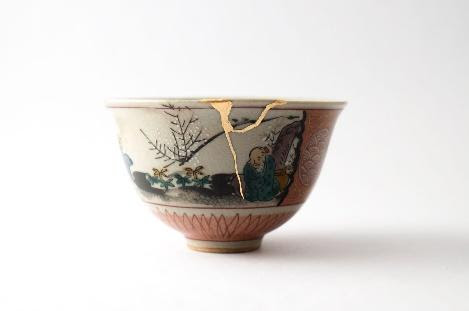“Thank you for your service” Marie Kondo, organising consultant.
Just recently I was flicking through Netflix looking for a good drama. Under ‘most watched’ was a series featuring the Japanese ‘organisational consultant’ Marie Kondo who has devised her own KonMari Method to save the world by tidying up.
I am well acquainted with Ms Kondo, not least because given my own – shall we say ‘relaxed’ – approach to tidying up would possibly make me a lifelong client. Indeed, over lockdown, with nothing better to do, my neighbour Saskia and I had embarked on a clear out and had duly bowed to and thanked our old shirts, jeans and little-worn ‘good-idea-at-the-time’ dresses for their service.
At the time it had seemed like a bit of a laugh, but when I saw Marie Kondo’s image again, I reflected on how much that small action of thanking my items for their service had assisted with clearing out and creating space.

Neatly folded clothes and pyjamas in the metal mesh organizer basket on white marble table. Marie Kondo style of garments declutter and sorting concept. Housewife using Konmari method of tidying up.
Drama search abandoned, I began to understand how Marie Kondo really does want to save the world with tidying up and how that very message could be borrowed and utilised by entrepreneurs and their companies looking to leave 2021 behind.
Back to the future?
It only feels like yesterday that I was writing about moving on from 2020, a disruptive year like no other. But here we are in autumn 2021 and it seems like a good time to take a leaf out of Marie’s book and review what we have, what to leave behind and what to take with us. So what is different from this year compared to last? And how does that affect the way we should review what we are thinking and how we will move forward?
Another year, another model?
One more year could perhaps provide more clarity on the way ahead, but the bestselling author and speaker Greg Satell, writing on Medium, believes it will take longer than that to recover our equilibrium and that recent ‘paradigm shifts will define the next decade’. To prepare for life in a post-covid world we need to acknowledge a number of things, including the fact that traditional methods may not work and that no one business model is necessarily a ‘fits-all’ solution, no matter how convenient it may be.
So what can we rely on? Of course we need business models, but we require those that can accommodate shift changes. So along with building trust within your ecosystem, you should also be looking for resilience and agility – key criteria for growing a company in any era. Of course, surrounding dynamics can affect these factors and we should be ever watchful for how these external forces can influence and determine our ability to be resilient and agile.
It’s all about trust
During these turbulent times, agility is about what value we create, having a longer impact rather than shorter gains. We need to adapt and build stakeholder trust to create the value your customer can – and will – connect to and remain loyal to, and that includes what you do and the way that you do it.
Building trust begins with knowing who you are. What do you have to offer? What’s important to you? As entrepreneurs we often have an ecosystem built on our own internal culture where we own everything and control unity through top-down leadership. The competitive advantage of the near future will depend on these ecosystems and the value they create. The customer sees one vision, so the question is how can we achieve what we want them to see going forward?
And perhaps this is where we can learn from Marie Kondo. As much as her philosophy of saving the world through tidying sounds, well, a little ‘out there’, she does have a point. But it’s not so much about tidying clothes as it is about how we manage our lives, with what we surround ourselves and how can we ‘spark joy’ by giving the things we truly love – and that have value in our lives – the space they need to flourish and not be suppressed by items that we hold onto unnecessarily.
How do you solve a problem like Marie?
As we move forward and review where we are and where we want to go, we should also learn to trust what we represent and ensure it is clear to others so that they, too, trust us and want to join our mission.

So, if Marie were to help us do some corporate tidying, how should we employ the tenets of her KonMari Method?
- Accept that something has served its purpose and thank it for its service. This is fundamental for Marie. We are all guilty of holding on to things that once made us feel a million dollars. And in the back of our minds there is always the thought that perhaps, one day, it will make us feel the same way again. However, it never does and in the end it just takes space in the wardrobe. It can inhibit you from finding other ways of standing out. Let it go and allow the right things to shine brighter in the knowledge that you will feel great again.
- Recognise the strength of keeping the right things even if you have to repair or upcycle them. Marie Kondo is an advocate of kintsugi, where you carefully mend the things you cherish rather than discard them, usually with lacquer and powdered gold. However, in their repair you highlight – literally – their imperfections. This golden thread doesn’t hide the item’s scars or history, but celebrates them. Metaphorically your golden thread can revive your purpose and run from you to your customers and beyond. Shining brightly your mission – like the kintsugi bowl pictured – will enjoy greater impact in the world and become an illuminated pathway to the future.
- Understand what truly “sparks joy”. Simplicity and clarity can bring you understanding, which in turn brings trust and confidence. If we are trying to get stakeholders on board, especially those that we do not manage, we have to be concise and clear about our mission and be seen to be living it joyfully. You might need to thank and bid farewell to elements of your own company for their service to create more space for the future – no one said it would be easy – but in saying goodbye to 2021, by thanking it for its service and the lessons learned, we can move on and create the space we need to make 2022 a year of opportunity.
Wondering where to begin?

Sign-up for our Lift-Off programme to discover how you can give the right space to what is most important to you and your customer.
The Lift-Off programme is the entry level to ‘Your Journey,’ our interactive training platform designed for female entrepreneurs to find the right, most relevant path to purpose-led business growth. Find out more >



